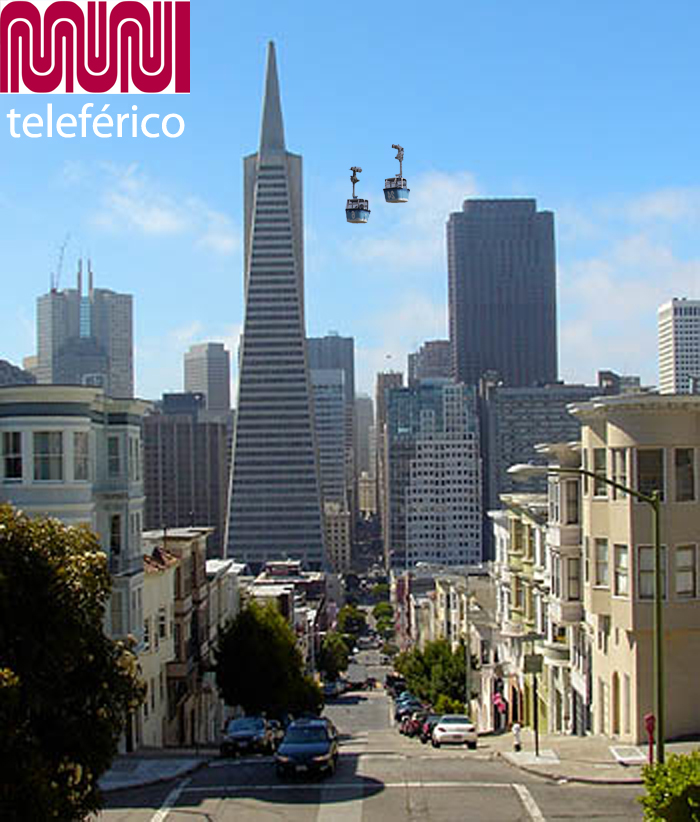San Francisco’s California Street Cable Car line is under-going a major rebuild. As such, Muni (the San Francisco Transit agency) felt the need to inform the public via signs, press releases, websites etc.
The Spanish translation of the press release, however, referred to the cable cars as “telefericos.”
As any regular reader of The Gondola Project knows, teleferico translates directly to gondola. Muni rider John A. spotted the error and whipped up the above image in an act of transit humour geekery so specific that it’s probably funny to only 3 dozen of the world’s entire population – and will simply confuse thousands of elderly tourists looking to ride the Muni Teleferico in the coming months.
And while the entire situation allows us all to have a lot of fun at the expense of a translator’s mistake, it does touch on a difficulty cable transit has as it begins to grow within the urban environment. That problem is nomenclature.
As I pointed out a long time ago there are dozens of names for cable technologies in English alone. Add in foreign languages, and the situation becomes positively absurd. Teleferico, telepherique, teleferik, seilbahnen . . . the list goes on and on.
That people insist on using erroneous terms to describe installations only frustrates the matter further.
The proposed London Thames Cable Car, for example, isn’t a cable car. It’s a gondola. Full stop. That complicates matters for researchers, planners, journalists and policy-makers. Why not just call the new gondola the “London Thames Underground”? It’s not accurate, but neither is the “London Thames Cable Car.”
After all, you wouldn’t call a Honda Civic an “SUV”, would you? Or how about calling a Macbook Pro a “desktop computer”? Imagine if you invited your family over to visit your brand new house in the suburbs and asked them how they all liked your new “condo.”
Whether we like it or not, the reason we classify things is so that we can understand them. Yes, it can be annoying. And yes, it can seem ridiculously anal at times. But we as a species have agreed that to foster communication amongst us we must call things by their proper names.
Sure the concept of a “proper name” is subjective and slippery. Anyone whose formative years took place in the 1990’s was probably forced to debate ad nauseum the true meaning of the term “alternative music” and no one ever came to a clear consensus. How we choose to use the term “light rail” is equally debatable and problematic.
Yet when we have a collection of technologies such as cable that make explicitly clear their defining features and, therefore, their exact names, it seems ridiculous that such a situation persists.
I’m not sure the problem will ever be resolved (it won’t), but it’s important to point out the problem for what it is: An unnecessary irritant that only complicates the further spread of the idea.



9 Comments
looks like even cable is gonna go wireless!
😉
I think you’re trying to impose a North American world view when describing the use of Cable Car in London as erroneous.
In British English, Cable Car is widely undertood to be a suspended transit system of some sort, and Gondola is a boat propelled by a singing Italian. Even in North America Gondola is ambiguous, also being type of railroad (railway) freight (goods) car (wagon). So not a good candidate for fruitful Googling.
I’ve run into this problem in writing transit study reports in English for clients from countries remote from both the UK and from North America. You can’t refer to a tram or a trolley because it means different things depending on the technical background of your reader (I tend to use Streetcar).
Sometimes it’s best to invent your own mode names, while defining them carefully, in the hope that nobody has used them before to describe something else. It also helps to make them technical and unattractive to make it less likely that they will be siezed on by a marketing person and attached to something unrelated (see for example Metro and its derivatives). So I commend your abbreviations for different technologies, while noting that I’ll have to go back to another part of the site to remind myself what they all are!
As far as I know however, Light Rail means moreorless the same thing on both sides of the Atlantic.
I see it both ways. That post was from a long time ago and my opinion has changed a bit – there’s no way to prevent people from using the term cable car, so it’s best to just kind of accept it. But it certainly would make everyone’s lives easier if we all used the same terms for the same things – but I guess one could make the same argument about language as well.
Just something to deal with as best we can, I suppose.